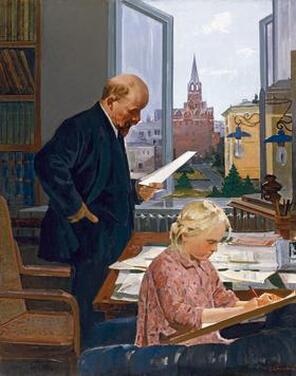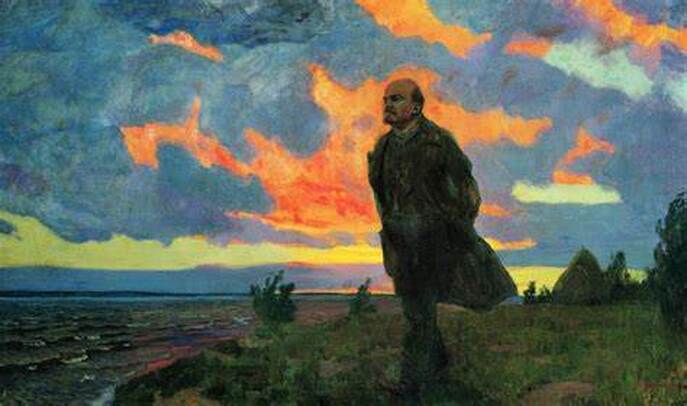|
1/7/2022 V. I. Lenin - Materialism & Empirio-Criticism. Commentary and Analysis (23/23). By: Thomas RigginsRead NowCHAPTER SIX: EMPIRIO-CRITICISM AND HISTORICAL MATERIALISM: SECTION FIVE: ERNST HAECKEL AND ERNST MACHIn this last section of Chapter Six, Lenin turns his attention to the philosophy of science of Machism. All of the Machists reject the natural materialist standpoint of the sciences, calling it metaphysics. Petzoldt (1862-1929), for example, declares the scientific assumption of external reality no better than the Indian belief that the world rests on the back of a giant elephant. "It makes no difference," he says, "whether the world rests on a mythical elephant or on just as mythical a swarm of molecules and atoms epistemologically thought of as real and therefore not used merely metaphorically." All of this Lenin calls sheer obscurantism, out-and-out reaction." He then mentions the "storm provoked by Ernst Haeckel's The Riddle of the Universe." This was a popular book written by a famous scientist, which was translated into many languages and appeared in many editions-- it was a best seller as we would say. Haeckel (1834-1919) was a biologist and his book was written to explain the origin of life using Darwin's theory of evolution as the basis of his explanation. Haeckel's book, published in 1899, is still in print. He was denounced by theologians and professional philosophers alike for his theories. Lenin says there was "one underlying motif" in the attacks on Haeckel, namely, "they are all against the ‘metaphysics’ of natural science, against 'dogmatism', against 'the exaggeration of the value and significance of natural science', against 'natural-scientific materialism.’” What is seemingly so strange about this is that Haeckel is actually a reconciliationist who “renounces materialism” and wants religion and science to work together. The problem is, as Lenin sees it, is that despite "his personal conciliatory tendencies and proposals concerning religion" [in this he is somewhat like Steven Jay Gould] nevertheless “The general spirit of his book, the ineradicability of natural-scientific materialism and its irreconcilability with all official professorial philosophy and theology .... gives a slap in the face” to all forms of Machism and subjective idealistic tendencies. Haeckel himself does not see the contradiction between his method and his goal due to "philosophical naiveté." The Machists and other idealist humbugs realize this and also realize that a hundred thousand readers of The Riddle of the Universe will pick up the natural scientific (materialist) attitude towards the world that these idealists have been combating. This is also the Marxist view-- i.e., the view of dialectical materialism. Lenin says: "The 'war' on Haeckel has proved that this view of ours corresponds to objective reality, i.e., to the class nature of modern society and its class ideological tendencies." Lenin concludes this chapter with a reference to Franz Mehring's review of The Riddle of the Universe in Neue Zeit. Haeckel's problem is that he has no conception of historical materialism. He is unable to apply his natural scientific materialism to social problems. Mehring writes, "Haeckel is a materialist and monist, not a historical materialist." And, "he who wants to be convinced that natural-scientific materialism must be broadened into historical materialism if it is really to be an invincible weapon in the great struggle for emancipation of mankind, let him read Haeckel's book." Haeckel's book demonstrates that natural scientific materialism underlies the method of the natural sciences and its dialectical development into historical and dialectical materialism is the only basis for bringing about the final liberation of humanity and the solution of the social question. Who could have predicted in 1908 what the world would be like in 2008? The general Marxist view more or less was that capitalism would have been replaced by socialism inspired by the October Revolution. Is it back to the drawing board? How can we know what 2108 will look like? The Chinese think that it will take a hundred years for them (using Chinese characteristics) to create the foundations for such a transition. What about the rest of us? Will Lenin still be read? If the social question hasn't been solved, I think so. CONCLUSION: There are "four standpoints", Lenin says, that Marxists should start from in evaluating empirio-criticism. 1. Understand "the thoroughly reactionary character of empirio-criticism. 2. Recognize that "the whole school of Mach and Avenarius is moving more and more definitely towards idealism" along with the most reactionary idealists. 3. Know that the "vast majority of scientists ... are invariably on the side of materialism." 4. Finally, "one must not fail to see the struggle of parties in philosophy, a struggle which in the last analysis reflects the tendencies and ideology of the antagonistic classes in modern society." SUPPLEMENT TO CHAPTER FOUR, SECTION 1: FROM WHAT ANGLE DID N.G. CHERNYSHEVSKY CRITICISE KANTIANISM? Lenin added this while the book was at the printers. He added it as an extra dig at the Russian Machists wanting to be Marxists. Most people in the West, and especially in the USA will never have heard of Chernyshevsky (1828-1889) but he was a very famous Russian revolutionary democrat and socialist who would have been well known to all of Lenin's readers. The point Lenin wanted to make was that Chernyshevsky opposed Kant from the left, as a disciple of Feuerbach, while Bogdanov et al opposed Kant from the right, from the Machist and hence idealist position and were backwards in their thinking even compared to Chernyshevsky whose views dated from the the 1850s and 60s. So much then for Materialism and Empirio-Criticism. But since so little is known about Nikolai Gavrilovich Chernyshevskii (NGC) here, I culled some info from The Great Soviet Encyclopedia [GSE] to introduce him. You can also Google him. The three major influences on NGC were German philosophy, French utopian socialism and English political economy (the same three factors that Lenin called the component parts of Marxism). NGC's philosophy was based on the anthropology of human nature and was a form of rational egoism. We look out for our own interests. This should lead us to become socialists [The Anthropological Principle in Philosophy 1860]. NGC was a follower of Feuerbach who was, in NGC's own words, "the culmination of German philosophy, which --- having now for the first time achieved positive solutions --- has abandoned its former scholastic type of metaphysical transcendentalism and, admitting that its own results has merged with the general theory of natural science and anthropology." For NGC, practice was the source of truth, it was "that immutable touchstone of all theory." In 1855 he wrote The Aesthetic Relation of Art to Reality in which he declared "beauty is life" meaning "what is of general interest in life --- that is the content of art." [All quotes are from NGC's works.] Art should look to the real world and portray it and "pass judgment on its manifestations." In his 1857 work Lessing: His Time, Life, and Work, he maintained that "the principal motive force of historical development" could in certain historical situations be literature. While NGC was a pre-Marxist revolutionary, he did hold that "intellectual development, like development in any other area, including the political, depends on economic circumstances." In 1861 he wrote a study called Essays on Political Economy (According to Mill in which he attacked the bourgeoisie, developed his own economic theory which he called "theory of the working people" which stated "the need to replace the present economic system with a communist one." NGC held that with socialism, "the separate classes of hired worker and employer will disappear, being replaced by a single class of people who will be workers and managers at the same time." NGC, being a pre-Marxist as I said, thought that Russia would be able to skip over the stage of capitalism and build socialism directly based on peasant communes. The GSE says that he, along with A. Herzen (1812-1870) was the founder of Narodnichestvo (the Narodnicks), also known as populism. The Russian government persecuted NGC from the early 60s to the end of his life by imprisoning him (seven years at hard labor) and placing him in internal exile for his writings and ideas. His 1862 novel, What is to be Done was read by Lenin who used the title for one of his most important early works. Lenin had great respect for NGC and said that he was the only high level philosophical materialist in Russia from the 1850s up to 1888. Well, if you have persevered thus far you have finally finished this series. Finis coronat opus AuthorThomas Riggins is a retired philosophy teacher (NYU, The New School of Social Research, among others) who received a PhD from the CUNY Graduate Center (1983). He has been active in the civil rights and peace movements since the 1960s when he was chairman of the Young People's Socialist League at Florida State University and also worked for CORE in voter registration in north Florida (Leon County). He has written for many online publications such as People's World and Political Affairs where he was an associate editor. He also served on the board of the Bertrand Russell Society and was president of the Corliss Lamont chapter in New York City of the American Humanist Association.
2 Comments
Charles Brown
4/13/2022 09:05:14 am
http://take10charles.blogspot.com/2022/04/yes-in-materialism-and-empirio.html
Reply
9/27/2023 06:13:28 pm
Great that you undertook a study of this most important and underappreciated work. Just a few comments:
Reply
Leave a Reply. |
Details
Archives
January 2022
Categories |


 RSS Feed
RSS Feed